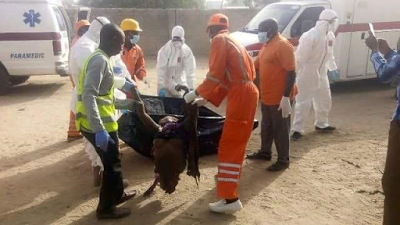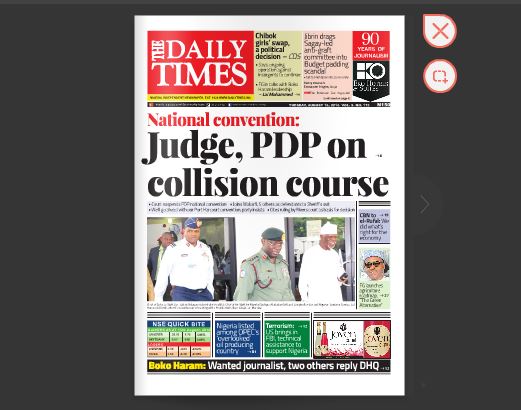We’ll partner FG to stop rice smuggling – Gov

Jigawa state governor Alhaji Abubakar Badaru has said that the state government is ready to partner the federal government to stop smuggling of rice into the country.
Governor Badaru Stated this in his office in Jigawa state during a courtesy call on him by agriculture correspondents on fact finding mission to the state on the production of Rice and Wheat.
He however, said that the major target is for rice production to be competitive, which is what is important. “If we are not competitive, no matter what mechanism we put around our borders, rice smuggling would persist”.
He said; “We have to produce rice competitively so that the consumers would buy the rice at cheap rate and that would discourage smuggling. Of course we know there are substandard rice been smuggled some are expired and we also know that some of the countries subsidized agriculture and that makes the price of rice cheap thereby attracting smugglers.
“I believe the states are willing and able to support the federal government in combating smuggling because all across the border lines we have communities and the communities would provide us with information in what is happening on the border towns which would discourage smuggling. Also, the issue of branding, we would try to see how best we can brand our rice adequately and there would be a market control to know the market that is not Nigerian made”.
The governor emphasized that the state will do everything possible within its powers to support the Federal government to stop rice smuggling pointing that, “at this initial stage that we are, if smuggling is allowed to continue, it would discourage our farmers and millers and the whole rice revolution would be thwarted.
“I believe in the next two years Nigeria would become more competitive in rice production and smuggling itself would reduce and the government would be able to control substandard rice especially those coming from the subsidized countries which is easier to control if we have some competitive elements in the production chain. That is what we are targeting and what the governments are doing to see that we make rice farming competitive.
On fertilizer and other farm implements, Badaru said price has already been reduced; “we are working with the best companies that would produce insecticides so that it would also be controlled locally.
“The same thing applies with the equipment for mechanization to see how best we can partner to produce the machines locally”.
The governor disputed recent statistic on rice production in Nigeria recently released by the federal ministry of agriculture, arguing that the statistics did not represent in reality the amount of rice produced in Jigawa state.
“I have gone through that statistic personally and I disagree with the figures. What we have here in Jigawa state is far beyond the statistics released. If they give you a statistics, ask them, how many hectares do they put under cultivation in Jigawa, and what is the average yield?
When you input the data you will realize would be different from the figures the statistics provided. We try as much as possible not to over project the production because we work based on a realistic projection.
“This is a national issue and it has to do with the National Planning, therefore, if you give a very high figure and it turns out to be less, then it would distort the statistics.
So it is better to give a very realistic figure that you know you would certainly achieve. Again, how the ministry of Agriculture does its statistics, I do not know because they have not visited us and our farmers to see what is on ground.
“But luckily, Agriculture correspondents are here, you have seen things yourselves and you would be able to tell them what we are doing.
This is dry season, when the rain sets in properly, our production capacity will be more than five times what you have seen now. We have between 70 and 100 hectares under cultivation in the dry season but when the raining season comes; you will see over five times what we are producing in dry season.
During the raining season, we are expected to have over 400,000 hectares under cultivation, so we expect a minimum yield of five tons per hectare on the dry season while we expect four tons per hectare on the raining season because we have no control over the rain and yield are not usually good.
“This is the best in the country, there are figures we have out there where people say they have seen eight tons per hectare but that is not the average.
We had instance where we have eight, nine and ten tons per hectare in specific field and in most of our clusters, we get as much as 7 or 7.5 per hectare, but when you take general farmers average; those that have done good practice and those that have not done good practice, you average five tons at the dry season and four at the raining season.
“When we came in two years back, it was 2.5 tons average yield. But now because of the clusters, because of a lot of enlightenment and provision of fertilizer by the federal government at a discount rate, we are moving to about four tones per hectares. A lot of farmers are doing six, seven and eight while some are still doing 2.5 tons per hectare.
But when you take the overall average, and take the numbers, you will see that 100,000 by 5 hectares would give you 500,000 tons and when you take 411 by 4, it’s about 1600 tons and if you add it up, it would give you about 2,100,000 tons. So that is the production capacity we expect but if somebody ask us we tell him we are expecting two million because we have to give you the correct statistics.
“In some states, I know they would tell you farmers are doing seven tons and they would compute the numbers by the seven hectares which is the maximum yield production.
When you take the general average, there are farmers that would just plant and would not have money to buy fertilizer, it would just grow without yielding much, such farmers would not get more than one ton per hectare but then the area would be marked as been cultivated. Therefore, where you are projecting, get the average accurately.
“We should be able to give the federal government accurate statistic so that the planning would be done well and there would not be shortage of rice; at the same time, the price mechanism can be checked based on the production, and it has to be presented correctly”, he stressed.










